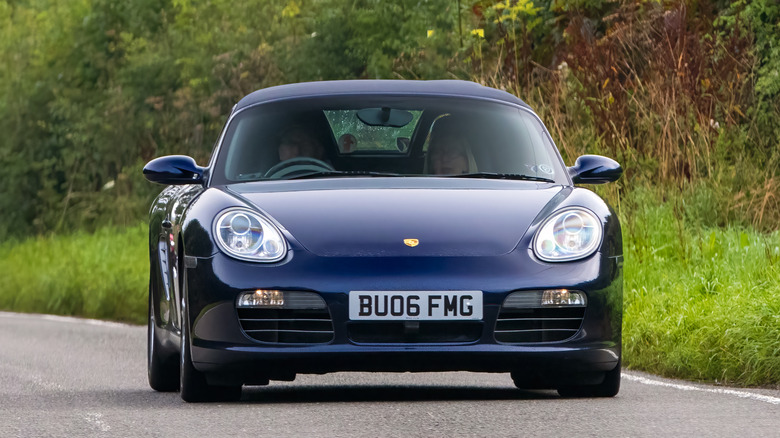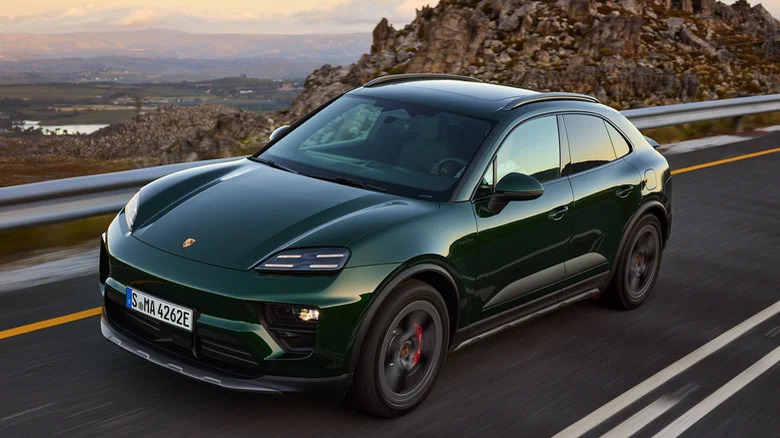Here's Why Porsche Is Discontinuing The Gas-Powered Boxster And Cayman
Porsche production manager Albrecht Reimold revealed the company's plans to discontinue the gas 718 Boxster and Cayman by the middle of next year. With their stylish flair, and respectable power, these two models were considered the most accessible sports cars for consumers. In fact, both the Cayman and the Boxster made SlashGear's list of the four most affordable future classic Porsches because of how closely their architecture resembled the original 911 while keeping average prices between $15,000 to $25,000.
The repercussions of Porsche's decision have already reverberated throughout Europe, where both models have been taken off the market. Only the Cayman GT4 RS and Boxster RS Spyder, still remain, as they are classified as limited edition exceptions to the rule. So why are these iconic legacy performers meeting such an untimely end? Essentially, it comes down to the culmination of two compelling factors: prioritizing the development of EV technology and the European Union implementing stricter emissions and cybersecurity regulations.
Prioritizing new EV technology
In recent years, the revolutionary EV framework has taken the automotive industry by storm. A standard EV engine consists of fewer components than its gas-powered counterpart, which means lower costs in maintenance and a higher lifespan beyond the typical 200,000-mile limit. Competition is heating up among automakers, with each brand striving to electrify consumers with their own unique lines of EV products, Porsche being no exception.
In January 2024 Porsche unveiled the 2024 Macan Electric, an EV luxury Cayenne crossover sporting a top speed of 136 mph and 476 lb-ft of torque, as its second official EV model and bid for lead competitor in the EV SUV category. Its first EV model, the Taycan, has already raised the bar industry-wide with its capacity to recoup 290 kW of energy through regenerative braking, outpacing competitor Tesla which only captures 60 kW.
As the company embraces this commitment towards electrification, Porsche intends to roll out new EV versions of both the Boxster and the Cayman. These electric 718 models are scheduled to debut in 2025, ushering in the next generation of technological design while still retaining the same spirit and dynamics that Porsche enthusiasts enjoyed so much about the original combustion models. Whether EV technology will meet overwhelming success is unclear, as SlashGear has already reported on the significant issues blocking widespread EV acceptance, such as insufficient charging infrastructure and affordability.
New EU emissions and cybersecurity restrictions
On July 1, 2024 the United Nations Regulation No. 155 (UN R155) went into effect, requiring automakers to integrate specific cybersecurity protocols in all vehicles sold at large volumes. Additionally, this regulation requires that automakers must maintain an audit-ready record at each step in the development showing all privacy measures that were implemented. Porsche would have to completely reengineer the Boxster and Cayman in order for these models to be in compliance with UN R155, a move too costly given the timeline for the launch of the EV 718s.
On top of these latest cybersecurity measures, the European Parliament voted in agreement that no new passenger cars or light automobiles will emit CO2 gases by 2035. How the EU plans to enforce this regulation remains uncertain, yet they intend to re-evaluate this goal every two years to assess progress. The combination of both of these new regulations presents a strong incentive for Porsche and other European automakers to completely reconfigure the processes used for vehicle development.
In other regions like North America, consumers have a little bit more time before these changes take full effect. The 718 Boxster and Cayman will continue to be sold until the launch of the upgraded EV models in 2025. So if you have ever been interested to take one of the classic luxury cars out for a spin, now is the time to strike before the clock winds down.


